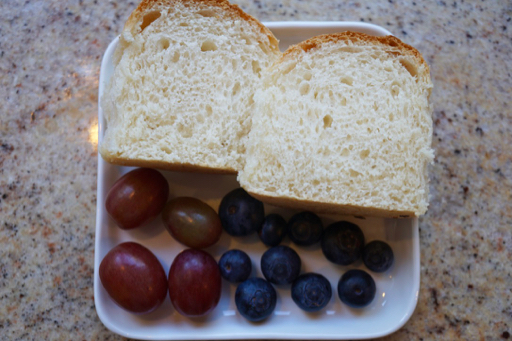This year's "15th night moon" or "Jugoya" 十五夜, which corresponds to the "Harvest moon" in the U.S., occurred on September 13 which was a Friday--Friday the 13th (!). Since it was a work day there was no time to make ”tsukimi dango" 月見団子 to celebrate the beauty of the moon. In addition it was cloudy, and the moon did not make an appearance so "tsukimi" or "moon gazing" was not happening. The next day, I made the
tsukimi dango in the morning so it was ready. In anticipation, we waited for moon rise. As you can see from the picture below the sky was crystal clear and the moon rose like a large round silver platter, even though it was a 1 day waning moon...Tsukimi was on.
We had our "tsukimi dango" with
"mitarashi" みたらし sauce as a desert. I never thought (especially when I was in Japan), I would ever make this dish myself but this is very good and the sauce really makes it.
Speaking of moons, in addition to the real moon, this year we had the pleasure of viewing moon flowers blooming, after a long absence, in our garden--the white flower shown on the right in the picture below. They bloom in the evening and glow softly in the ambient light as it gets dark withering in the morning light. In contrast this year we also had morning glories called "asa-gaoa" 朝顔 (morning faces) in Japanese, (shown on the left in the picture below). The morning glories and moon flowers have a counter cyclical blooming cycle. The morning glories bloom in the morning when the moon flower is fading and fade in the evening when the moon flower is blooming. The result is that there is always a flower in bloom.
Digression alert: Many years ago we used to grow moon flowers and morning glories in our side yard. We planted the seeds in the ground and the plants climbed up strings reaching the trellis which screened one side of the deck from sight of our neighbor's backyard. We had enough sun for these plants to cover the entire side of the deck trellis. As shown in the picture below we had a glorious wall of morning glories providing a beautiful privacy screen.
Even more impressive were the large moon flowers, some as large as small plates, which mysteriously opened in the evening. Some survived until morning so we could see both flowers at the same time as shown in the picture below. While enjoying the soft glow of the moon flowers one evening we saw something big flying and sounding like a hummingbird feeding on the nectar of the moonflower. It was way too late for a hummingbird to be about so what in the world was this creature? Turns out it was something call a
hummingbird moth. They fly like a hummingbird and drink nectar like a hummingbird. What a treat! We had no idea something like this even existed but we were privileged to have the opportunity of see one.
For various reasons we have not been able to plant these flowers for many years. This year my wife found a space along the fence that she thought might work. So we planted the seeds, strung the string and waited and waited and waited. Finally in late August the first moon flower made its appearance. The picture above is of this year's crops. They were rather pathetic compared to the our old morning glory and moon flower display, but this is quite an improvement especially since we did not have them for many years.
So back to the subject at hand; tsukimi. It may be difficult to celebrate tsukimi on the exact day of "Jugoya", but this was certainly a fine second best. The homemade dango were much better than the ones that we have bought commercially. They are very tender in texture with a pleasant rice flavor. The absolutely crucial ingredient to this dish is the sauce. It adds a burst of salty sweetness that is irresistible.

























